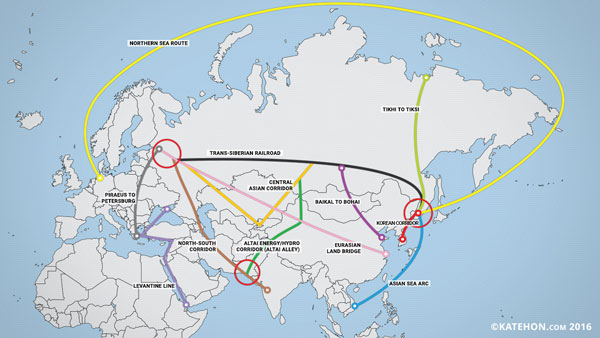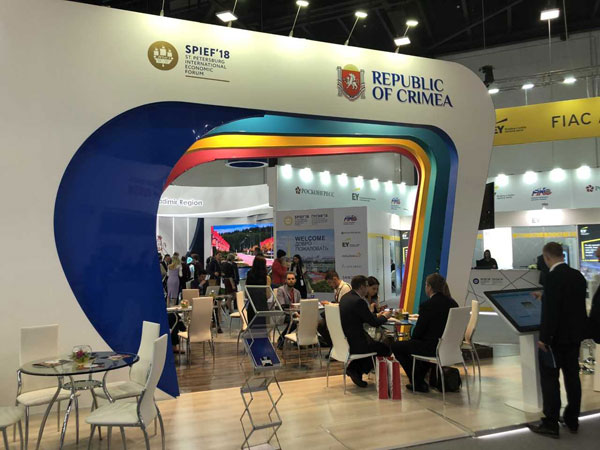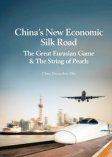A Brave New World: China, Russia, and ASEAN Lead Eurasian Free Trade


Greater Eurasia
A strange sense of an unexpectedly inverted trade world has permeated this weeks St. Petersburg International Economic Forum (SPIEF). A feeling of developing changes in the manner in which global trade is conducted is beginning to be replaced by something new, if yet embryonic.
It is a sense that Eurasia is starting to come into its own to replace trade initiatives now being discarded, partially with the momentum created by China’s Belt & Road Initiative but also due in part to a new, unproven and more aggressive version of United States hegemony. That includes a reaction to the related issues created by the latters use of sanctions as a trade weapon.
Lest we forget how inverted the current global trade regime has become, at SPIEF we have the Vietnamese Communist Party Secretary Nguyễn Văn Bình, who is also a Politburo member, Secretary of the Central Party Committee and Head of the Central Economic Commission of the Communist Party of Việt Nam proudly announcing that Vietnam is committed to the free trade agreement of the TPP. Vietnam is a member of ASEAN, also having a Free Trade Agreement via ASEAN with China and with the Eurasian Economic Union, which includes Russia.
But hold on. Wasn’t communism in part all about protectionism and anti-free trade, the closing of borders, and especially so when faced with democractic nations? Meanwhile Donald Trump, President of the greatest democracy in the world, has pulled the United States out of the TPP. That same democracy is ripping up multilateral trade and other carefully negotiated deals all over the globe – the aforementioned Trans-Pacific Partnership, NAFTA, the recent Iran agreement, an aborted North Korean summit and other long, medium and short term plans are being, in the words of several delegates here “thrown in the dumpster”. It is an era of free-thinking, sound-bite counting, ultra short term knee-jerk chaos.
This is not the typical behaviour of the “Champion of the Free World.” Everything, in global trade terms, has now been thrown up in the air. Politically, the situation has become inverted: Communists and Dictatorships advocating Free Trade, and the most powerful Democracy in the world becoming Protectionist. These are strange times.
At SPIEF, there seems a growing awareness that the situation is consequently starting to usher in a new global period where the United States can no longer be viewed as a harbinger of free trade or global agreements. It is instead introducing a policy where it appears to be every man for himself, and especially so for the US. After all, this is an administration that went it alone in pulling out of the TPP, went it alone in pulling out of the Iran nuclear deal, wouldn’t listen to anyone else’s misgivings, and almost immediately threatened EU businesses with sanctions if they did business with Tehran as a result of changing what had been a recently signed, yet supposedly long term multilateral agreement.
As has been noted elsewhere, that’s not entirely friendly behaviour. For the United States, unpredictablity and unreliabiity is the new normal.
Remarkably, the baton for predictability seems to have passed to the communists and so-called dictatorships that remain the sole champions of trying to maintain and keep together a workable global trade unity in the current world.
The issue for the United States – and the EU – is that countries are now changing their policies to cater for this new reality. With the US increasingly being seen as unreliable and far too willing to introduce sanctions – previously a measure of punishment – to hammer home its trade demands, a new thought process in dealing with this is leading to new policies being adopted that have the intention of excluding the US altogether and subsequently diminishing its role. It should also be noted that such policies, if enacted by China and Russia, are also likely to have considerable staying power: both have leaders in place for the long term, will last beyond Trump, and are capable of moulding Eurasia to their will.

The Crimea stand at SPIEF 2018
In terms of Russia, it is important to note a new, and somewhat more reform-minded government is now in power. Yes, Putin remains the President, but a new breed of ministers are now coming into the fray that are the offspring of the reforms enacted since the collapse of the Soviet Union, with the architects of that Soviet transition to a stumbling early market economy now long retired. Instead, a new breed of reform minded, economically savvy individuals wanting change and reform are now taking positions – under Putins watchful eye indeed, but they are now in position. When asked for example about how Russia intended to handle the continuing sanctions, Russia’s smart young Finance Minister, Anton Siluanov stated that the country, in response not just to the sanctions but in response to an increasingly unpredictable and by inference, untrustworthy United States, would be embarking on a programme of liberalisation. He stated this meant “Opening up Russia more, having a more liberal regime; in order to provide a new quality of growth.” That reminds me directly of Deng Xiaopings words on opening up China back in the late 1980’s. As do Siluanov’s comments about internal growth: “We are seeking a policy of internal development, to minimise our vunerability to external factors, by exploiting our own resources and creating a more predictable economic environment. We need to rebuild an economy of trust.”
These are wise words, and in earlier years gone by could just as easily have been uttered by an American President. Yet they were not, these are instead the aims outlined by the current Russian Finance Minister. If these stated goals manifest themselves, then we are going to be in for an interesting time in Eurasian trade and development, as this will impact both the EU to the west and Asia to the east.
It is of interest to note that following Vietnam’s lead in Asia, several ASEAN nations are also in negotiations to sign up to a Free Trade Agreement with the Eurasian Economic Union. Singapore and Indonesian discussions are well underway, as are negotiations with India, while Iran agreed a deal just a few weeks back. Turkey is also interested in an FTA with the EAEU. Those ASEAN members who like Vietnam were part of the TPP are also keen to maintain that agreement -with or without the United States.
These EAEU agreements are also going hand in hand with developing Eurasian interconnectivity. The International North-South Transport Corridor links India to Russia via Iran, while Turkey is part of the Lapis Lazuli corridor linking the Caucasus to Central Asia, and is home to the southern stretch of rail linking China and the EU. These developments are changing the effectiveness of Eurasian connectivity and the movement of goods and people. China is now also building infrastructure that directly connects Eurasia to the EU. The Belgrade-Budapest rail link is Chinese funded, while Chinese contractors recently won a contract to build a connecting bridge in Croatia, an EU nation.
It is also pertinent to note that Asian and Chinese trade with Russia was just eased with two important developments this past few days; China itself signed a Free Trade Agreement with the Eurasian Economic Union, which includes Russia, and China also signed up to the international TIR convention on road transport. Those two developments alone bear out Siluanov’s statements concerning the opening up and “more liberal” approach to trade in Russia. It also indicates that Beijing and Moscow are increasingly co-ordinating trade and development polices throughout Eurasia, and are looking to the continent itself to consolidate these goals. Both have in fact expressed interest in developing the “Greater Eurasian Partnership“.
In some sense, this leaves the European Union between a rock and a hard place. It is tied to the United States via trade, although these cords of commerce are becoming frayed, and via NATO, which the US is demanding more money for. On the other hand it sits on the same massive landmass as Russia and China. What are the options? In an era when Chinese goods can turn right up on the borders of the EU duty free, it is perhaps time Brussels began to realise it sits on the same piece of rock as Moscow and Beijing, and adjust its policies accordingly. If not, the trade policy view from SPIEF suggests a new version of Eurasian interconnectivity and development is being created, with or without the primary involvement or assent from the EU or the United States. A brave new Eurasian trade world is already unfolding.
About Us
Silk Road Briefing is produced by Dezan Shira & Associates. The firm provides business intelligence, investment advisory, due diligence, tax advisory, corporate establishment and structuring, accounting, payroll and related professional services throughout China, India, ASEAN, Russia and the Eurasian region, servicing both Governments and Multinational clients. To contact us please email silkroad@dezshira.com or visit us at www.dezshira.com
 Related Reading:
Related Reading:
![]() China Lays Foundations for Eurasian Free Trade after TPP Failure
China Lays Foundations for Eurasian Free Trade after TPP Failure
![]() SPIEF 2018 Omits Mentioning The United States By Name But Points Fingers At “Global Betrayer Of Trust”
SPIEF 2018 Omits Mentioning The United States By Name But Points Fingers At “Global Betrayer Of Trust”
Silk Road and OBOR Business Intelligence
Dezan Shira & Associates´ Silk Road and OBOR investment brochure offers an introduction to the region and an overview of the services provided by the firm. It is Dezan Shira´s mission to guide investors through the Silk Road´s complex regulatory environment and assist with all aspects of establishing, maintaining and growing business operations in the region.
China’s New Economic Silk Road
This unique and currently only available study into the proposed Silk Road Economic Belt examines the institutional, financial and infrastructure projects that are currently underway and in the planning stage across the entire region. Covering over 60 countries, this book explores the regional reforms, potential problems, opportunities and longer term impact that the Silk Road will have upon Asia, Africa, the Middle East, Europe and the United States.







